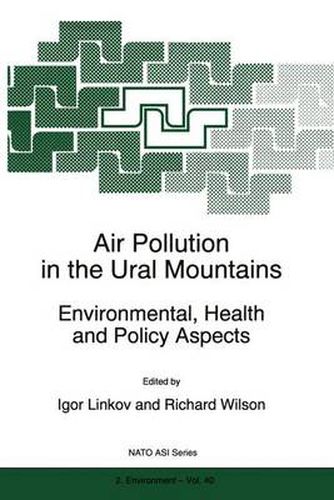Readings Newsletter
Become a Readings Member to make your shopping experience even easier.
Sign in or sign up for free!
You’re not far away from qualifying for FREE standard shipping within Australia
You’ve qualified for FREE standard shipping within Australia
The cart is loading…






This title is printed to order. This book may have been self-published. If so, we cannot guarantee the quality of the content. In the main most books will have gone through the editing process however some may not. We therefore suggest that you be aware of this before ordering this book. If in doubt check either the author or publisher’s details as we are unable to accept any returns unless they are faulty. Please contact us if you have any questions.
Mankind has created pollution, and has suffered its consequences since time immemorial. This has intesified greatly since the industrial revolution. One of the main problems in society, and a major function of government is how to cope with this pollution. 80 years ago the maxim used to be the solution to pollution is dilution ; to dilute any pollted water supply in a large river, or to build a tall chimney stack to dilute air pollutants into the air so that concentrations of pollutants are always low. Since 1950 western countries have gone further and made major attempts to reduce the emissions of the most important pollutants. The discussion of what is an important pollutant has changed. To S02 and heavy metals such as cadmium or arsenic we now add fine particles and even (when we discuss global climate change) C02. The experience and practice of the western countries was only partly followed in the USSR (although the switch from use of coal to natural gas in major cities around 1970 was very important). Since the collapse of the USSR it has become fashionable both in the west and inside Russia to blame all society’s ills on pollution. The statistics do not bear out that conclusion, but pollution remains an important issue which can be reduced without significant detriment to other societal values.
$9.00 standard shipping within Australia
FREE standard shipping within Australia for orders over $100.00
Express & International shipping calculated at checkout
This title is printed to order. This book may have been self-published. If so, we cannot guarantee the quality of the content. In the main most books will have gone through the editing process however some may not. We therefore suggest that you be aware of this before ordering this book. If in doubt check either the author or publisher’s details as we are unable to accept any returns unless they are faulty. Please contact us if you have any questions.
Mankind has created pollution, and has suffered its consequences since time immemorial. This has intesified greatly since the industrial revolution. One of the main problems in society, and a major function of government is how to cope with this pollution. 80 years ago the maxim used to be the solution to pollution is dilution ; to dilute any pollted water supply in a large river, or to build a tall chimney stack to dilute air pollutants into the air so that concentrations of pollutants are always low. Since 1950 western countries have gone further and made major attempts to reduce the emissions of the most important pollutants. The discussion of what is an important pollutant has changed. To S02 and heavy metals such as cadmium or arsenic we now add fine particles and even (when we discuss global climate change) C02. The experience and practice of the western countries was only partly followed in the USSR (although the switch from use of coal to natural gas in major cities around 1970 was very important). Since the collapse of the USSR it has become fashionable both in the west and inside Russia to blame all society’s ills on pollution. The statistics do not bear out that conclusion, but pollution remains an important issue which can be reduced without significant detriment to other societal values.